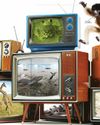
Computers were invented to follow instructions – to do calculations quicker than humans can. However, their inventors knew this was just the beginning. More than 70 years ago, pioneering computer scientist Alan Turing predicted that computers would one day be able to learn from experience and solve problems that they had not been pre-programmed for. In other words, they would be able to think.
That day is now! Artificial intelligence (AI) has quietly become part of everyday life – from smart speakers that respond to your voice, to software that recommends what to watch next. In April, the UK became the first country in Europe to allow AI-assisted cars to drive on motorways. In hospitals, AI has taken over routine tasks like examining X-rays and brain scans, leaving doctors more time to spend with their patients. It’s also AI that allows social media filters to swap your face with a cat or a potato (although this probably wasn’t what Turing had in mind).
SQUARE EYES Al software sorts through more than 80 years' worth of new content uploaded to YouTube each day to find videos you'll like.
Esta historia es de la edición Issue 63 de The Week Junior Science+Nature UK.
Comience su prueba gratuita de Magzter GOLD de 7 días para acceder a miles de historias premium seleccionadas y a más de 9,000 revistas y periódicos.
Ya eres suscriptor ? Conectar
Esta historia es de la edición Issue 63 de The Week Junior Science+Nature UK.
Comience su prueba gratuita de Magzter GOLD de 7 días para acceder a miles de historias premium seleccionadas y a más de 9,000 revistas y periódicos.
Ya eres suscriptor? Conectar

Should musicians stop touring?
Multiple concerts travelling around the world have a big impact on the environment.

Animal awareness
What would it feel like to be another animal?

Hamza Yassin
Go behind the camera with a wildlife filmmaker.

WILDLIFE WATCH
Ben Hoare goes on a safari from his sofa to discover how nature documentaries are made.

TITANS
The biggest dinosaurs grew to truly epic proportions. Peter Gallivan tells the super-sized tale of these giant reptiles and discovers why they grew so large.

Gladys West
Meet the hidden figure behind the navigation system in your smartphone.

Would you eat insects to save the planet?
Some say you should be eating beetles for breakfast and locusts for lunch.

Why are people allergic to things?
Find out why your body is sensitive to some substances.

WHIZ KIDS
Claire Karwowski asks what makes people tick and if there is a secret to being smart.

Big Manny
Meet social media's science sensation.